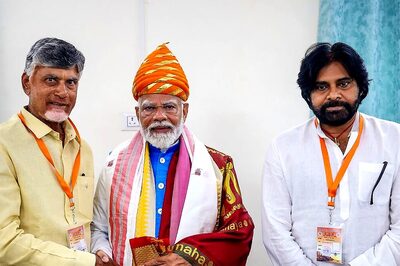
views
India and Israel, two nations with vastly different demographics, geographical sizes, and cultural contexts, have both emerged as vibrant hubs for startup innovation. While India’s startup ecosystem has witnessed significant growth in recent years, Israel has been hailed as the “Startup Nation” due to its remarkable achievements in technological innovation.
With its vast population of over 1.4 billion people, India possesses a massive talent pool. However, harnessing this potential and translating it into innovative startups requires concerted efforts. On the other hand, Israel, with a significantly smaller population of around 9 million, has achieved remarkable success in fostering a culture of innovation and producing ground-breaking startups. Israel’s ability to leverage its limited population size to drive innovation highlights the importance of targeted support and collaboration within a tightly knit ecosystem.
India’s demographic advantage lies in its large youth population, providing a valuable resource for entrepreneurial talent. The challenge lies in providing the necessary support and infrastructure to channel this potential effectively. Israel’s startup success can be attributed, in part, to its strong focus on nurturing young talent through specialised education, mentorship programmes, and support systems that encourage risk-taking and an entrepreneurial mindset from an early age.
Role of Ecosystem and Culture
Both India and Israel have produced several unicorns over the past decade and have implemented policies to support startups, albeit with different approaches. India’s “Startup India” campaign has introduced measures to simplify registration, provide tax incentives, and establish funding support. Israel, on the other hand, has fostered an entrepreneurial culture by offering a range of support programs, including grants, incubators, and access to venture capital. India can learn from Israel’s emphasis on creating an ecosystem that not only supports startups but also nurtures a culture of entrepreneurship. Israel’s small land area has driven a sense of urgency and the need to be globally competitive. This proximity has facilitated collaboration, knowledge sharing, and networking opportunities, fostering a tight-knit entrepreneurial community.
India’s vast land area poses challenges in creating similar levels of proximity and networking, but concerted efforts to build startup clusters and technology hubs can help bridge this gap and create synergies among startups. Israel’s cultural mindset is deeply rooted in innovation, driven by a strong sense of resilience, adaptability, and the ability to think outside the box. Israeli society encourages risk-taking, embraces failure as a learning opportunity, and celebrates entrepreneurial success. India, with its rich cultural heritage and diversity, has the potential to foster a similar culture of innovation by promoting an entrepreneurial mindset, encouraging experimentation, and providing support structures that value and reward innovation.
Fostering an Entrepreneurial Mindset
India’s “Agnipath” scheme was launched on 14 June 2022, a year ago which allows aspiring youth termed as “Agniveers” to serve four years in the military. Around 46,000 youth have enrolled in the first batch. It’s focused on attracting young talent from the current technologically-savvy society and returning a skilled, disciplined, and motivated workforce to society.
But here is the catch, military training not only emphasises on skills such as leadership, but it helps develop an entrepreneurial mindset through entrepreneurial skills. The world knows about Israel’s mandatory military service, which has played a significant role in nurturing the youth with skills such as leadership, problem-solving, teamwork, and adaptability. Many Israeli startups are founded by military veterans who bring their valuable training and experience to the entrepreneurial world. It can be a perfect example for Agniveers to create future entrepreneurs.
Entrepreneurs are known to face numerous obstacles and setbacks, and the discipline and resilience cultivated through military training help them stay focused, overcome challenges, and adapt to changing circumstances. They solve complex problems and take critical decisions under uncertainty which is fundamental to military training. It also emphasises invaluable learning for entrepreneurs who need to build and manage teams, delegate tasks, and create a collaborative work environment.
In the entrepreneurial world, being adaptable and agile is crucial to respond to market shifts, customer needs, and technological advancements for long-term success. As quoted by Acharya Chanakya, “No one can defeat a powerful mind.” While India does not have mandatory military service, it can explore avenues to leverage its vast defence forces through youth-focused schemes like Agnipath for instilling an entrepreneurial mindset and skills to further fuel India’s startup growth.
The author is a policy analyst at the Indian School of Business and a startup mentor. The views expressed in this article are those of the author and do not represent the stand of this publication.




















Comments
0 comment